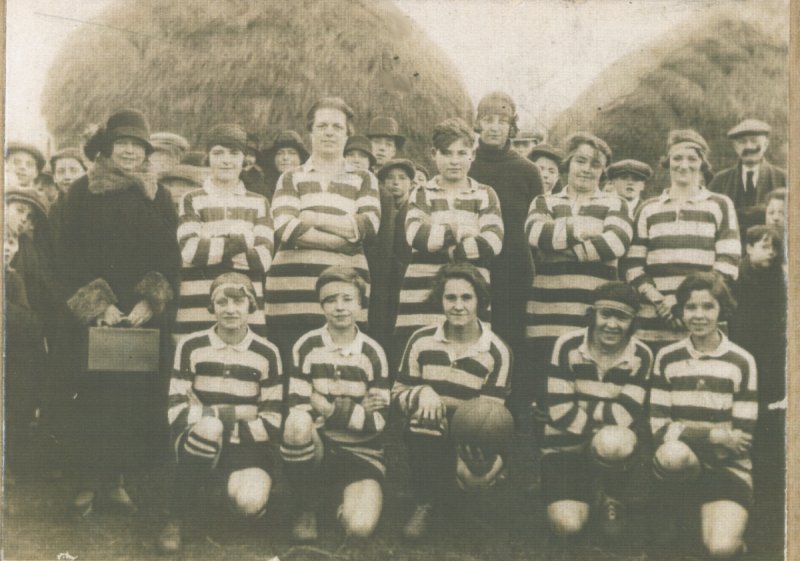
During the Great War women's football teams flourished in North-East England, their members being drawn from the munitions factories, which were largely staffed by women. After the signing of an Armistice in November 1918 the female munition workers were speedily discharged, or "demobilised" to use the euphemism of the time. The works-based football teams disbanded, as their members lost contact with one another, and in most instances got married. A few enthusiasts continued to play, and teams representing the North East played a few games against teams from Lancashire, where women's football was still very popular. The format of the games was the same as during the war - they played on league grounds for charitable causes, often attracting crowds of several thousands. There was also a resurgence at grassroots level during the North-East miners' strike of 1921, when village teams took to the field to raise money for local hardship funds. Not everyone was happy with this, either within the football establishment, or society in general, and in December 1921 the Football Association instructed all affiliated clubs to deny the use of their grounds to women's football teams. In response, the English Ladies' Football Association was established to regulate the women's game. As an organisation it was not a success, and it appears to have had no influence whatever in the North East, where women's football effectively disappeared. Some activity may have continued, but it is not possible to make an accurate assessment as the local newspapers had little interest in reporting it.
The effectiveness of women's football in raising money for charity had not been forgotten however, and around 1927 a remarkable development took place in Darlington. An enterprising lady named Lily Galloway formed a women's football team to raise money for the Miners' Boot Fund. With support from Darlington Football Club, from whom they borrowed strips, they played a number of games on wasteground near the Five Arches railway bridge, and also journeyed to venues at St Helen's Auckland, Witton Park and Blackwell.
The team became known as the Quaker Ladies, however it is not clear exactly when they adopted this name. One of the earliest matches to be reported in the Evening Despatch dates from 3rd January 1927, when they were described as the "Darlington Labour Women." They were defeated 3-5 by the "Windlestone Labour Women" at an unknown venue. The picture below is of the team which took part in this game, and the rather spiteful cartoon beneath it appeared in the Evening Despatch the day after the game. The picture was taken at Stobart's Farm, Albert Hill. This was probably Westfield Farm, near to Haughton Road. The precise location is not known, however there was a football ground nearby situated off East Mount Road (then called Upper John Street), and this may have been the venue.

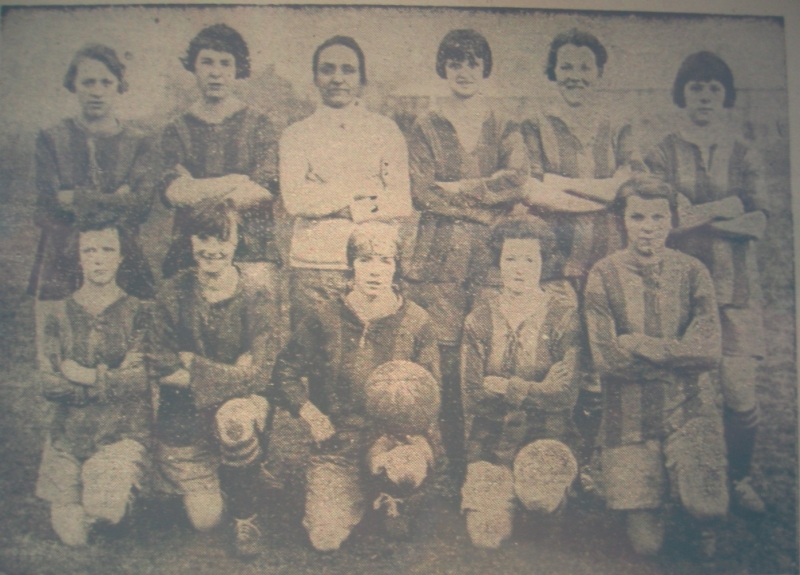
The team captain, Sarah Hooper, and her sister Betty, had excellent footballing pedigrees; their uncle, Charles Roberts, made 271 appearances for Manchester United between 1903 and 1912, and their brothers Bill and Mark had long careers with Darlington and Sheffield Wednesday respectively. Sarah, the elder, had been a munitionette footballer during the Great War, playing for Darlington Railway Athletic.
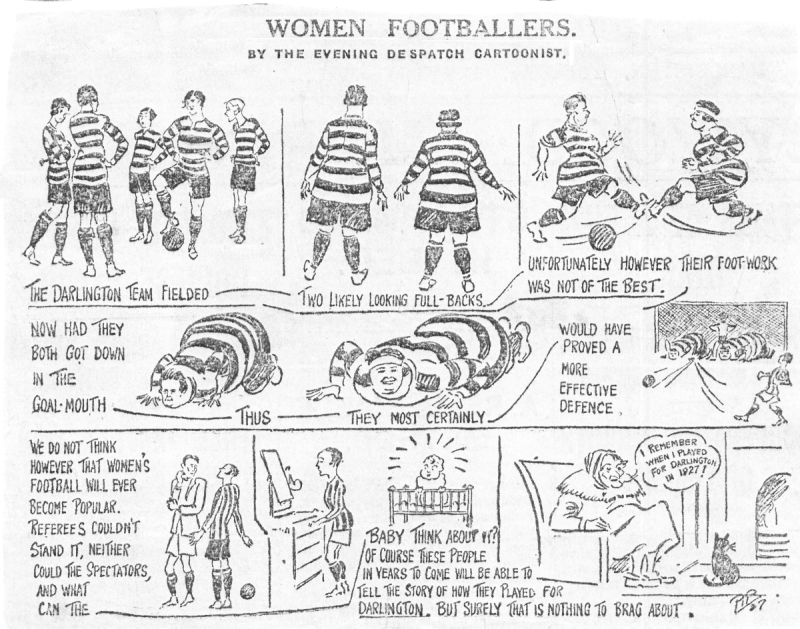
A series of annual Good Friday matches began on 6th April 1928 when the Darlington Women once again met the Windlestone Women, (their political affiliations having been dropped from the teams' names). The match was in aid of the National Union of Railwaymen's Orphans' Fund, and took place at the Darlington Railway Athletic Ground in Brinkburn Road. A draw of two goals each was the result, and the day's entertainment was rounded off with a concert at the Temperance Hall.
The fixture was held at the same venue and for the same charity on Good Friday 1929, but this time it was contested by teams from the Darlington branches of Woolworths and Marks & Spencers. Marks & Spencers won 2-0, both goals being scored by Sarah Hooper. According to both the Northern Echo and the Northern Despatch the teams were officially named the Darlington Ramblers and the Darlington Rangers, but the reports did not explain which was which.
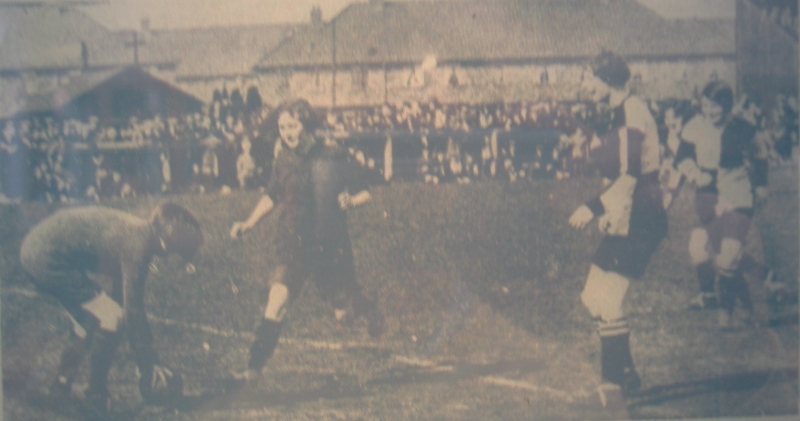
Woolworths and Marks & Spencers contested the fixure again on 18th April 1930. It was preceded by some controversy; at a Council of Christian Witness meeting some weeks earlier it had been described as a "degrading display", and criticism had also been made of the fact it was being played on Good Friday. These criticisms were strongly rebutted by the referee, Mr Frank Walton, who denied it was degrading, and praised the women for showing great sportsmanship. At the same time he revealed that even he was influenced by narrow-minded view of womens' sport, commenting, "At the same time I would not support womens' football as a regular thing. Competition football would be too strenuous and dangerous for girls." Councillor W. G. Loraine also dismissed the criticisms, pointing out that Good Friday and Christmas Day were the only two days of the year when the great majority of railwaymen were free.
The match, which was highly entertaining, was attended by a crowd of 7,000 and filmed by Pathe News. Woolworths opened the scoring with a penalty taken by Donlan, but Betty Hooper equalised shortly afterwards. M. Alderslade gave Woolworths the lead again after 30 minutes' play, but once again Marks & Spencer equalised, this time through M. Patrick, although the Woolworths' keeper, P. Yole, tried to make out that the ball had not crossed the line. There was a hold up early in the second half when M. Ettrick collapsed after a charge and was carried unconscious to the touchline. The Pathe cameraman showed that paparazzi are not a new phenomenon by running across the pitch to film her recovering. Both M. Alderslade and Betty Hooper each got a second goal to make the final score a 3-3 draw.
The first appearance in the Good Friday fixture by a team named the "Quaker Ladies" was on 3rd April 1931, when they defeated the Darlington Red Caps by three goals to one. Prior to the game the Durham F.A. had banned the teams from playing at the Brinkburn Road ground, in belated accordance with the Football Association's ruling of December 1921. After furious protests however they relented and the match went ahead at its usual venue. Two of the Quaker Ladies' goals were scored by Betty Hooper, by now the sole survivor of the 1927 team. Lily Galloway, the founder of the team, had hung up her boots and was now its trainer.
In 1932 the Quaker Girls faced new opposition - a team from Terry's chocolate factory in York. The match was played on a practice field behind the Brinkburn Road ground, suggesting that the County Durham F.A. had reimposed their ban. Nevertheless, 4,000 spectators turned out to watch. Darlington got off to a bad start when their captain, A. Patrick, twisted her knee a few minutes into the game. She played on gamely until half-time, but centreforward Annie Hogg, who twisted her ankle a few minutes after Patrick's injury, had to leave the field immediately. With their team reduced to only ten players for most of the first half the Quaker Girls did well to make it to the interval with the score only 2-1 against them. In the second half Mary Patrick came on in place of her injured sister, and a second goal from Betty Hooper brought Darlington level again. The strain of playing with one less player eventually told, however, and Terry's scored two more goals to make the final score 4-2 in their favour.
It is difficult to know how often the women were playing, as very few of their games were reported in the newspapers. Those which did make it into the press columns tended to be around public holidays, for example a game between the Quaker Ladies and Witton Park on Boxing Day 1932, which the Darlington women won 7-1.
Switching the fixture to a practice pitch was apparently not enough for the misogynists at the F.A., and in 1933 there was a completely new venue - the Wire Mills ground in Longfield Road, Harrowgate Hill. The Quaker Ladies team on the day was weakened by the inclusion of three reserves, and the visitors took full advantage of this, winning once again by 4 goals to 2.
They say revenge is sweet. Rarely can there have been revenge as sweet as that enjoyed by the Quaker Ladies on 30th March 1934 when they next entertained Terry's. The venue had been switched again, this time to the rugby pitch at Hunden's Lane, where the long and vindictive arm of the F.A. could no longer trouble them. The ground could not accommodate the crowds of the past, and only 2,000 were in attendance, but those who did turn up watched a treat, as the Quaker Ladies trounced Terry's 10-1. The star player on the day was Priscilla Roddam, who scored five times, but Olive Pattison also got a hat-trick, and Greta "Jackie" Plews and Hannah Britton one each. Jessie Hope got the solitary consolation goal for Terry's.
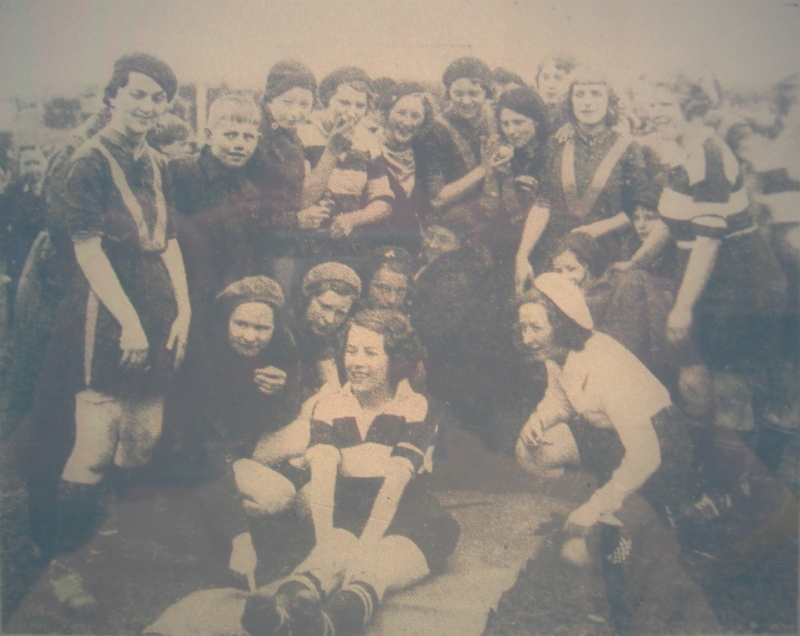
Hunden's Lane was again the venue in 1935. The teams lined up as follows:
Quaker Girls: P. Yole, Betty Hooper, Florrie Robinson, Renee Summers, Hannah Britton, Nancy Preston, R. Dugdale, Priscilla Roddam, Dolly Childs, Olive Pattison, Doris Brown
Terry's: Joan Weaver, Ethel Audair, Nora Hughes, Hilda Atkinson, Rosie Rook, Freda Prest, Eileen Pyatt, Annie Eden, Jessie Hope, Marie Milnes, Molly Berry.
Jessie Hope opened the scoring for Terry's, but Brittan and Doris Brown each netted a couple before half-time to give Darlington a 4-1 lead. Early in the second half Hope found the net again, but there was no further scoring and the Quaker Ladies notched up another victory.
One disadvantage of playing football on a rugby pitch is the height of the crossbar - 3m instead of 2.44m. This was rubbed home in 1936 when Terry's once again scored first through a penalty which went clean over the Darlington goalkeeper's head - but still under the bar. The Quakers Ladies rallied however, and scored three goals to win the game, while Terry's could manage only one more.
The Quaker Ladies maintained their superiority over Terry's in 1937 and 1938, winning by margins of 5-2 and 2-0 respectively. 5,000 spectators watched them in 1938, 2,000 more than the crowd at Feethams to see Darlington Reserves in action against South Shields. Two members of the side - Priscilla Roddam and Greta Plews were then picked to play for England against Scotland at the White City* on 11th June 1938. They did Darlington proud, scoring all four of England's goals in their 4-2 defeat of the Scots. Greta Plews got a hat-trick and Priscilla Roddam, named Peggy Rodham by the Newcastle Journal added the fourth. The members were getting older however, and many of them had married. On 24th March 1939 Lily Galloway was reported in the press as follows: "Ever since September, which was the end of our season, I have been looking for new talent, but without success, so the Quaker Girls will not enter the field this season." The 1939 Good Friday match at Hunden's Lane went ahead nevertheless, when a women's team from Stockton - the Stockton Nomads took their place. Amy Greenfield gave Stockton a half time lead, but Terry's scored twice through Joan Harrison. However, by the time Good Friday came round again the nation had other things on its mind, and this popular event passed into history.
* Not the White City in London, but the greyhound stadium at Scotswood Bridge, which opened on 7th October 1937 and closed on 26th May 1951.
© Patrick Brennan 2006
| Date | Result | Notes |
|---|---|---|
| 1927-01-03 | Darlington Labour Women 3 Windlestone Labour Women 5 | Darlington: Thompson, O'Hare, Carver, Bibby, Mooney, Galloway, Hamilton, B. Hooper, S. Hooper, A. Mooney, Penman Windlestone: M. Temple, M. Parkin, F. Pedelty (capt.), O. Wake, E. Waters, K. Graham, G. Hewitt, K. Scott, M. Waters, M. Bolton, M. Gibbons |
| 1928-04-06 | Darlington Women 2 Windlestone Women 2 | Played at Brinkburn Road in aid of the N.U.R. Orphans' Fund |
| 1929-03-29 | Woolworth's Girls 0 Marks and Spencer's Girls 2 | Played at Brinkburn Road before 3,500 spectators in aid of the N.U.R. Orphans' Fund. scorer: Sarah Hooper (2) |
| 1930-04-18 | Woolworth's Girls 3 Marks and Spencer's Girls 3 | Played at Brinkburn Road before 7,000 spectators in aid of the N.U.R. Orphans' Fund. scorers: Donlan, Alderslade (2) for Woolworth's; Betty Hooper (2), Patrick for Marks and Spencer's |
| 1931-04-03 | Quaker Girls 3 Redcaps 1 | Played at the Brinkburn Road ground before 3,000 spectators in aid of the N.U.R. Orphans' Fund. scorers: Hunt, Hooper (2) for the Quaker Girls; Fleetham for the Red Caps Quaker Girls: P. Yole, E. Brumley, N. Elgie, D. Holliday, A. Patrick, D. Harker, L. White, R. Summers, B. Hooper, F. Hunt, T. Armstrong Redcaps: Hornby, Rusk, Rusk, Fleetham, Duff, Buick, Murphy, Murphy, Graham, Courtney, Allison |
| 1932-03-25 | Quaker Girls 2 Terry's Athletic Girls 4 | Played in a field behind the Brinkburn Road ground before 4,000 spectators, raising £34 for the N.U.R. Orphans' Fund scorers: B. Hooper (2) for the Quaker Girls; V. Alderson (3), R. Deighton for Terry's Quaker Girls: D. Holliday, L. Graham, E. Bromley, D. Haygar, A. Patrick (capt.), H. Thompson, B. Hooper, R. Summers, A. Hogg, P. Rodham, G. Donald Terry's: N. Cox, E. Audaer (capt.), J. Groves, L. Theasby, M. Midwood, R. Deighton, L. Evans, M. Hardcastle, V. Alderson, G. Stacey, H. Hudson |
| 1932-12-26 | Quaker Girls 7 Witton Park Girls 1 | Played at Darlington |
| 1933-04-14 | Quaker Girls 2 Terry's Athletic Girls 4 | Played at the Wire Mills ground, Longfield Road, Harrowgate Hill, before 6000 spectators, in aid of the N.U.R. Orphans' Fund. scorers: Britton, Brown for Quaker Girls; Ashton (2), Evans, Theasby for Terry's |
| 1934-03-30 | Quaker Girls 10 Terry's Girls 1 | Played at Hundens Lane, Darlington, before 2,000 spectators, in aid of the N.U.R. Orphans' Fund. scorers: Priscilla Roddam (5), Olive Pattison (3), Hannah Britton, Greta Plews for Quaker Girls; Jessie Hope for Terry's |
| 1935-04-19 | Quaker Girls 4 Terry's Girls 2 | Played at Darlington before 2,500 spectators, in aid of the N.U.R. Orphans' Fund. scorers: Britton (2), Brown(2) for Quaker Girls; Hope (2) for Terry's Quaker Girls: P. Yole, Betty Hooper, Florrie Robinson, Renee Summers, Hannah Brixton, Nancy Preston, R Dugdale, Priscilla Roddam, Dolly Childs, Olive Pattison, Doris Brown Terry's: Joan Weaver, Ethel Audair, Nora Hughes, Hilda Atkinson, Rosie Rook, Freda Prest, Eileen Pyatt, Annie Eden, Jessie Hope, Mariel Milnes, Molly Berry |
| 1936-04-10 | Quaker Girls 3 Terry's Girls 2 | Played at Hundens Lane, Darlington, before 10,000 spectators, in aid of the N.U.R. Orphans' Fund. |
| 1937-03-26 | Quaker Girls 5 Terry's Girls 2 | Played at Hundens Lane, Darlington, before 3500 spectators, in aid of the N.U.R. Orphans' Fund. scorers: P Robson (3), Greta Plews for Quaker Girls; A Eden, Gladys Theasby for Terry's |
| 1938-04-15 | Quaker Girls 2 Terry's Girls 0 | Played at Hundens Lane, Darlington, before 5,000 spectators, in aid of the N.U.R. Orphans' Fund. scorers: Priscilla Rodham, Greta Plews |
| 1939-04-07 | Stockton Nomads 1 Terry's Girls 2 | Played at Hundens Lane, Darlington, before 3000 spectators, in aid of the N.U.R. Orphans' Fund. scorers: Joan Harrison (2) for Terry's; Amy Greenfield for Stockton |
To view these films go to http://www.itnsource.com (you will need to register) and select the "Advanced Search" option. In the "Filter by source" panel deselect all except British Pathe. Enter the reference number of the film in the search box and click on "Search". When the search function returns the clip click on the title (not the icon). This will display a descriptive page with some still shots. To view the clip click on "View this Story."
| Reference | Film Title | Details |
|---|---|---|
| BP24043082809 | Football for Girls - Degrading? | 42 seconds silent coverage of Woolworths v Marks and Spencers in 1930 |
| BP280430100826 | Ladies Football | 1 minute 16 seconds coverage with sound commentary of Woolworths v Marks and Spencers in 1930 |
| BP09043176713 | Aren't Girls Wonderful? | 1 minute silent coverage of Quaker Girls v Redcaps in 1931 |
| BP25043582504 | News in a Nutshell | 30 seconds coverage with sound commentary of Quaker Girls v Terry's in 1935 (part of a general newsreel lasting 4 minutes) |
| BP13043687920 | Darlington v Terry's | 1 minute 22 seconds coverage with sound commentary of Quaker Girls v Terry's in 1936 |
| BP170439100709 | Active Girls of Today | 1 minute coverage with sound commentary of Stockton Nomads v Terry's in 1939 (preceded by 40 seconds coverage of roller skating) |
Patrick Brennan
Rowlands Gill - November 2006
![]()